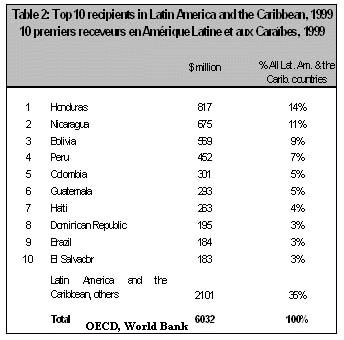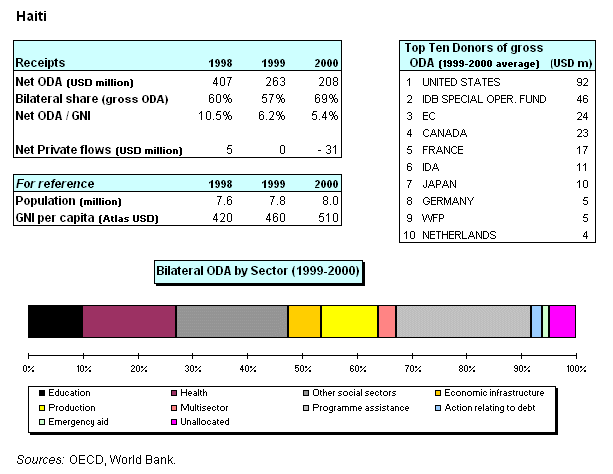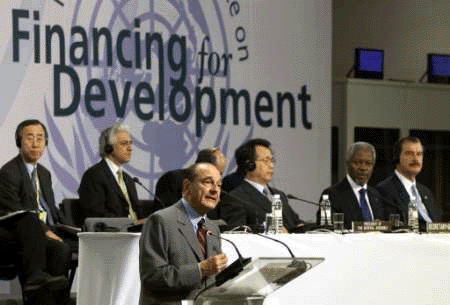
| Want to send this page or a link to a friend? Click on mail at the top of this window. |
First published March 23, 2002
|
| Why subsidize the rampant corruption and gross incompetence |
| of most Third World nations' totalitarian dictators by giving |
| them more foreign aid? |
__________ |
|
CAMBRIDGE, MA. - More than 2000 years ago Jesus said "The poor always ye have with you," but 2000 years later or so the United States (U.S.) and the European Union (E.U.), rather, echoed "We give the poor foreign aid," suggesting that history has not proven him wrong.
Days before the United Nations (UN) huge international conference on financing for development in Monterrey, Mexico, this week, the U.S. and the E.U. each pledged billions of dollars to poor nations.
The U.S. will spend $5b, up from 10b, or a 50% increase, on foreign aid over the next three years or so. And the E.U.'s share of foreign aid, U.S.$7b, up from U.S.$18.4b (an average of 0.33% of GDP), will amount to U.S.$25.4b (an average of .0.39% of GDP) annually by 2006.
But the problem with most of the intended recipients of aid is that the analysis of their governments, to begin with, shows the latter hold elections only to later steal them.
So, too, they have never lost their potential for gross human rights violations, including hacking to death, even their presumed political opponents.
Judging by the regrettable events of the past two years, at least, Haiti, whose de facto and corrupt president is Jean-Bertrand Aristide, is one of them, and prominently so.
At first, the strangest fact about Haiti's May 2000 elections, including the November presidential vote, was that, regrettably, many democratic opposition members and supporters heard bang, bang and within seconds they were all dead.
The plot, ultimately, involved declaring his Lavalas (flood) Family party's candidates (including himself), from the neighborhood to the Haitian national palace, winners of those elections. No wonder why the other political parties 'candidates were thereafter told "you did not make the grade; go back home to study; if you study hard enough, hopefully, next time you might be happy about your report cards."
One day last fall, to be precise, Dec. 3rd, 32 year-old Haitian radio journalist, Brignol Lindor, was hacked to death in broad daylight in the Caribbean nation's provincial city of Petit-Goâve by members, including Deputy Mayor Dumé Bony, of Aristide's Lavalas Family party.
In the early morning of April 3rd 2000, prominent Haitian radio journalist and commentator, Jean Léopold Dominique, was brutally murdered in the courtyard of his Radio Haiti-Inter station. Dominique's murder, in fact, occurred months after he questioned Aristide during a radio interview about hundreds of millions of dollars in aid that Haiti had received from the international community.
"President Aristide, let's now turn to a different subject; to be honest with you, I'm having problems understanding why the majority of Haitians continue to endure abject poverty when, in fact, the country has received hundreds of millions of dollars in aid; I would very much appreciate it that while you are here in this studio you reflect on this very particular issue that has long been of concern to many people in this country," Dominique, who also inquired about his largely questionable fortune, said to Aristide.
The contents of Dominique's charge-sheet, of course, about the hundreds of millions of dollars that Haiti had received from the international community, could and even today easily be substantiated.
 |
|
|
|
Despite continuing sharp criticism by many international human rights groups, among them Human Rights Watch, Amnesty International and Reporters Sans Frontières, the international French Group known in English as Reporters Without Borders that defends imprisoned journalists and press freedom the world over, also United States Secretary of States Colin Powell and members of Congress, the perpetrators of both, Dominique and Lindor's murders, including many others, have yet to be taken out of the circulation to face the bar of justice.
I can only agree with many critics, including United States' Treasury Secretary Paul O'Neil, of foreign aid that they are correct and that further subsidizing the corrupt, totalitarian and murderous Third World nations' dictators - from Zimbabwe's Robert Mugabe to Haiti's radical leftist Jean-Bertrand Aristide, and from Cuba's Fidel Castro to a multitude of other Third World nations' and this, at the expense of the industrialized world's taxpayers, will do more harm than good.
Precisely, the totalitarian dictators will have the capital needed, though a great many of them have already acquired millions of narco-dollars, to pay for the cost (economic) of re-structuring their "Caravans of death," in addition to stealing a substantial portion of aid money, while their citizens continue to endure dehumanizing poverty. Above all, they will turn their long failed states into irreversible disasters - if many of them are not already so.
 |
 |
| In the above photo, French President Jacques Chirac addresses the United Nations' conference on aid to the poorest countries in Monterrey, March 22, 2002. Some 50 world leaders are attending the U.N.'s summit on global poverty. Mexican President Vincente Fox (R) and U.N.'s Secretary-General Kofi Annan (second from R) look on. REUTERS/Jack Dabaghian |
| Foreign aid can be a waste of money |
Consequently, given the present dimensions of poverty in the Third World nations, foreign aid will help a substantial number of citizens create a situation that in the distant future they become engines of economic progress. Their new economic status will (multiplying effect), in turn, raise living standards, that is less of the nearly half of the people (2.5b) in the world who now live on less than U.S.$2 a day, and the fifth who survive on a sum of money that is inferior to U.S.$1, according to the United Nations, the World Bank and Organization for Economic Co-operation and Development, will be caught in the vicious circle of deprivation.
And, even more, poor nations will cease to be an incubator for terrorism. Terrorism will no longer be a "Damocles sword" hanging over the wealthy nations, specially the U.S., as the odious crime of September 11th and others, but the latter of a lesser degree, suggest.
Only when the "Grand-thieves- presidents" or "Grand-thieves-prime-ministers," including their subalterns and partners in crime, whose mismanagement of their nations' financial affairs has long caused their states' public affairs accounts to read like a drug-addict's credit-card statement, are no longer in charge, and the rule of law, democracy and human rights become the norms.
| From abject poverty to engines of economic progress |
Adam Smith, who in 1759 came to prominence with the Theory of Moral Sentiments, though he is best known for his great work of political economy: An Inquiry into the Nature and Causes of the Wealth of Nations (1776), which laid the foundations of classical free-market economic theory, observed: "Little else is required to carry a state to the highest degree of affluence from the lowest barbarism but peace, easy taxes and tolerable administration of justice, all the rest being brought by natural course of things."
To paraphrase Smith's contention, you can be a brutal dictator (I'm not advocating contempt with democracy) and still consign, in part, to the archives of history the extreme conditions of poverty that your citizens have long been subjected to.
There are no miracle cures to the Third World nations' incalculable number of problems - such as many citizens believe the dictators to be, and others see them in socialism or communism. The best course, though most dictators have no appetite at all for progress, would be to start investing in education, liberalizing the economy, developing a strong legal system (commercial), create and maintain an effective banking system, to name only these ones - policies that many former poor nations, even lower-middle-income countries (U.S.700-$3,000), saw as crucial to attract foreign direct investment and promote growth.
The departure of Chile, for example, from a lower-middle-income economy, a Marxist economy to an upper-middle- income economy, and capitalist so, was the result of the political and economic policies, which reflect those just listed above, instituted and maintained by totalitarian dictator, Agusto Pinochet, shortly after he assumed the presidency of the South American nation through a September 11th 1973 coup d'état in which the sitting socialist president, Salvador Allende Gossen, found death, and brutally so.
Pinochet's horrible human rights record has long been a matter of painful heated debate, especially after his October 16th 1998 arrest by British authorities on the order of Spanish judge Baltazar Garcon. Still, it is fair to say today's lessons are that globalization - the fast-paced growth of trade and cross border investment - continues to be the norm and communism, including its failed policies, the exception in Chile, which over the course of the past few years has become a simpler and more austere country.
Despite all the ills of neo-liberal policies of openness and privatization, which the Marxist-Leninists often blame for everything that goes wrong, which may include a dog that meets death after being hit by car while attempting to cross a street, but thanks, in part, to the brutal dictator's sound economic policies, today the Andean nation's economy figures among the many upper-middle-income economies that the world has ever known, despite a decline without parallel nearby, in Argentina, which in the early 19th century was one of the world's ten wealthiest countries - even ahead of France and Germany.
| The needy world waits for the Samaritan |
The evidence is clear that the needy world continues to wait for the wealthy world to help alleviate its suffering. Humanitarian aid, however, is a different matter, that is it does help achieve a far lesser goal when compared to foreign aid, which often comes in the form of a package, including money.
The wealthy nations may not entirely ignore the plight of millions of victims of terror and hungry citizens around the world. They may help feed them, at least, through non-governmental organizations. That will be the starting point of one year, given the consensus that there will be an infusion of aid once reform has succeeded in many of the Third World nations, producing, to begin with, responsible and honest leaders, but not the grand thieves, who today continue to wreck them
The writer, Yves A. Isidor, is an economics faculty member at the University of Massachusetts-Dartmouth and spokesperson for We Haitians United We Stand For Democracy (wehaitians.com), a Cambridge-based nonpartisan political pressure group.
| Related |
| Wehaitians.com, the scholarly journal of democracy and human rights |
| More from wehaitians.com |